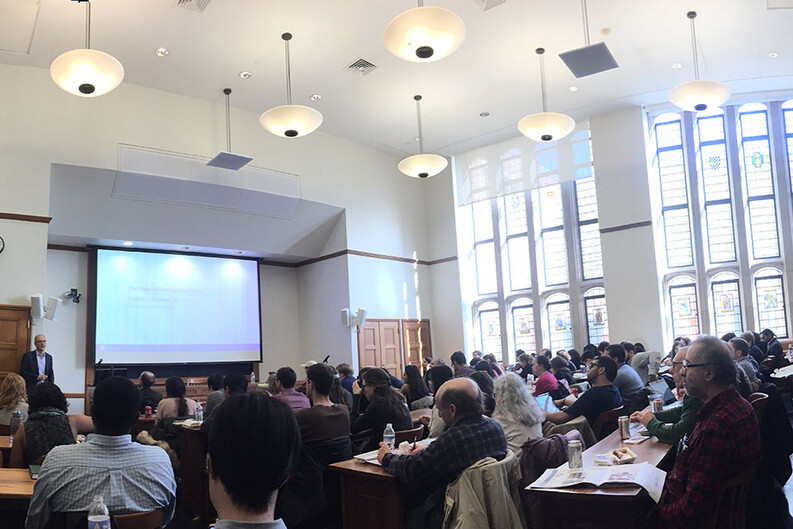Solomon Center Hosts Dr. Ezekiel Emanuel on the Future of Virtual Medicine

On February 21, 2019, the Solomon Center for Health Law and Policy at Yale Law School, in collaboration with the Yale Health Law and Policy Society and the Yale Law and Technology Society, welcomed Dr. Ezekiel Emanuel, M.D., Ph.D. Emanuel is a policy expert and Obama administration alumnus and current chair of the Department of Medical Ethics and Health Policy at the University of Pennsylvania. Dr. Emanuel gave a lunch talk discussing the past, present, and future of virtual medicine. He argued that virtual medicine is not the panacea that it was promised to be a decade ago.
In his opening remarks, Dr. Emanuel refuted the common consensus in Silicon Valley and the venture capital community that the future of health care lies in big data, machine learning, AI, and analytics. Pointing to recent studies of virtual medicine intervention efficacy in areas of congestive heart failure, prescription drug adherence, dietary habits, and exercise, Emanuel showed that innovative solutions had no significant difference to the accepted standard of care. Emanuel posed that these examples are evidence that virtual medicine will never replace the physician-patient relationship. Instead, the role for virtual medicine is to supplement and support this relationship.
Keenly aware of his audience’s hesitation to accept this critique of the largest sector of current health innovation, Dr. Emanuel turned to case studies of successful virtual medicine, to illustrate how any successful medical innovation still needs people. Emanuel highlighted the success of Iora Health’s use of virtual medicine to support a patient’s health team through data coordination. The company’s “low-tech” use of text messaging for follow-ups is an example of how technology can support an already established patient-provider relationship in medicine.
While relationships are tantamount to success in primary care settings like those of Iora Health, virtual health advocates argue that virtual medicine can have large impacts in certain medical specialties, and Dr. Emanuel agreed. Discussing the future of virtual medicine, Emanuel highlighted potential areas of successful innovation in the realms of tele-ICUs, behavioral health, M.D. to M.D. consultation, follow-up care for chronic conditions, minor care resolution, patient communication, and radiology and imagining. Even then, Emanuel stressed, at the center of each of these innovation areas there still remains the primary role of humans in medicine.
Following the lecture, Dr. Emanuel took questions on logistical and regulatory aspects of virtual medicine from an audience well-versed in the topic. A chief concern raised by numerous audience members was how equity played a role in virtual medicine. Addressing a question about the use of virtual medicine to improve equity in the case of abortion access, Emanuel, mindful of his lack of experience in obstetrics and gynecology, stated that at the end of the day social resources like social services, are much more impactful than big data interventions.
This answer, echoed in other responses to questions, showed what Dr. Emanuel felt was the risk of putting too much effort into virtual medicine. By viewing virtual medicine as the cure-all for poor health, we inevitably shift our attention away from other areas of medicine, such as behavioral care, that already suffer from limited resources. This unrealistic view of virtual medicine and health in general is to Dr. Emanuel a recipe for inevitable failure.


